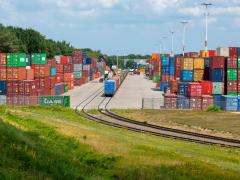The resilience of regional labour markets to economic shocks
Although increasing attention is being paid to the resilience of regions to economic shocks, theoretical and empirical insights into the determinants of regional resilience remain limited. This paper makes a first step in quantifying regional resilience. A model was used to explore how the following three regional factors jointly contribute to the resilience that regions have to economic shocks: 1) the network of buyer–supplier relationships within and between regions; 2) the level of correlation between industries, which facilitates intersectoral labour mobility; and 3) the geographical position of a region, which determines commuting options.
The supply network mainly determines the propagation of an economic shock, while possibilities for intersectoral and interregional labour mobility affect a region's economic capacity to recover from such shocks. The paper presents the case of the Netherlands, to illustrate the workings of our model, using data on buyer–supplier relationships within and between Dutch regions, as well as on intersectoral and interregional labour mobility.
Authors
Specifications
- Publication title
- The resilience of regional labour markets to economic shocks
- Publication date
- 2 July 2014
- Publication type
- Publication
- Magazine
- Journal of Economic Geography
- Product number
- 1525




